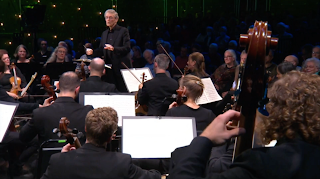Boston Baroque revisits Beethoven's 9th for new season
Beethoven’s music has long captivated for its rapt splendor. But hearing his most enduring works on period instruments often reveals their full power and intensity.
Heard via Martin Pearlman and Boston Baroque in their seasoning opening last month, Beethoven’s Symphony No. 9 teemed vigorously in all the right places.
Pearlman and his period instrument forces performed the symphony in celebration of Boston Baroque’s 40th anniversary ten years ago. Now entering its 51st year, they have revisited the symphony with an uncommon freshness. Only in isolated spots did this revisited reading fall out of balance.
The grandest effects revealed themselves in the choral finale. By turns luminous and charged with tension, the movement spotlighted the Boston Baroque chorus and orchestra in some of its most superb music making in recent memory.
The broad view Pearlman took as conductor let the phrases unfold naturally. The "Ode to Joy,” projected darkly by the low strings, flowered beautifully in the woodwinds. The chorus sang with crisp diction and cohesive blend, surging to powerful heights in the “Freude trinken alle Wesen.” The orchestra played with just as much panache, particularly in the impish janissary march.
The quartet of guest soloists captured the sheer elation of Friedrich Schiller’s text. Tenor William Burden sang with radiant intensity. Soloman Howard’s cavernous bass conveyed seismic urgency, making the “Freude, schöner Götterfunken” carry palpable gravitas. Filling out the vocal ensemble were soprano Heidi Stober and mezzo-soprano Daniela Mack, together making the quartet passages ring like a crystal goblet.
But it took Pearlman and the orchestra time to reach these dramatic heights. Much of that had to do with his fitfully stiff direction in the opening movement, where dotted figures failed to engender enough tension and momentum. The Scherzo fared better, lilting spryly towards the bucolic Trio. And despite moments of wandering intonation, the Adagio ultimately took flight in the winds and strings.
The rest of the concert balanced reflection with dramatic flair.
The Elegiac Song, Op. 118 sets a short but beautiful poem that mourned the death of the wife of Beethoven’s landlord and sometime patron. Pearlman drew searching pathos from his forces, each line stinging with sweet sorrow.
The Overture to Coriolan, Op. 62 generated the most power and zest. Pearlman told the audience that this was the first work he ever conducted—at age 12 for a class at Interlochen. Now heard through his more experienced hands, this performance was riveting. Accents fell like hammers; wind and string lines surged like lightning. Though a stalwart podium presence through all of this, Pearlman was in his element. And that’s no surprise. He and Boston Baroque have had fifty years to get it right.


.jpg)


Comments
Post a Comment